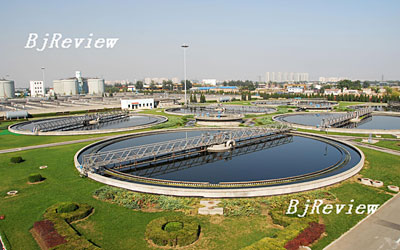|

Beijing is no "Venice," floating on water. In fact, getting enough water is a problem for the city, which has to survive on conserved rainwater and water diverted from other places.
At present, the average per capita fresh water resources in Beijing are no more than 300 cubic meters, which is an eighth of the national average and one thirtieth of the world average. Per capita water resources in Beijing are far below the internationally accepted alarm level of 1,000 cubic meters. Official statistics show that at the end of 2007, Beijing's resident population was 16.3 million, 520,000 more than the previous year. During the two weeks of the summer Olympics 2.5 million more people will flock to Beijing, including 450,000 foreign tourists, 25,000 athletes and coaches and 25,000 journalists from around the world, and about 2.05 million visitors from other parts of China. This will further strain Beijing's water supply system.
Relevant government departments have implemented several programs to guarantee adequate and safe water supplies for the Olympics, revealed Jiao Zhizhong, head of Beijing Water Authority, at a recent meeting. These programs target four key areas including water resources conservation, water delivery, water safety and flood management.
Jiao pointed out that the host city of the Olympics usually consumes 10 to 20 percent more water in the Olympic year than in a normal one. Hence, Beijing has to "borrow" water from other areas. Jiao stated that the Beijing section of China's South-to-North Water Diversion Project was completed at the end of last year. Jiao expects the diverted water to arrive at Beijing this April, or at worst, no later than the opening of the Olympics.
China's South-to-North Water Diversion Project is a 500-billion-yuan answer to the severe imbalance in water resources across China. The project is to build a spectacular system of canals and tunnels that divert water from the Yangtze River to the northern part of China, across several provinces.
Water recycling
Although China's South-to-North Water Diversion Project can alleviate water shortages in Beijing, the government has been constantly reminding residents and the constructors of the Olympics facilities of the importance of water conservation.
In recent years, Beijing Municipal Government has invested hundreds of millions of yuan in constructing or expanding water treatment facilities and sewage systems. Last year, 480 million cubic meters of water was recycled, accounting for 14 percent of total water. Before the opening of the Olympics this year, 11 new water-recycling plants will be built in Beijing, which will expand the annual recycling capacity of Beijing to 600 million cubic meters, accounting for 17 percent of total water supply.
Water recycling equipment is required for all Olympic facilities in Beijing. Recycled water or rainwater will be used for landscape water circulation, according to Li Qijun, Director of Beijing Hydraulic Research Institute. The newly built Beijing Olympic Park is crisscrossed with water, including a 200-hectare manmade lake. All rivers and lakes in the park will be replenished with recycled water. Researchers have been brought in to design a hi-tech water recycling system for the park. "Almost all water used in the park is treated and recycled," said Duan Wei, Assistant General Engineer of Beijing Water Authority.
Beijing does not only conserve and reuse ground water, but also rainwater. "We have a new understanding of rainwater. In the past, we controlled floods, now we manage floods," Duan explained. The annual precipitation in Beijing is about 500 mm, supplying 100 million cubic meters of rainwater, which is about two months' supply for Beijing residents.
Now, Beijing residents use wells or water tanks to store rainwater, which is to be used to water grass and wash cars. These water storage facilities will save tens of thousands of tons of water each year. Beneath the surface of many Olympics facilities are "secret weapons" to collect water.
The 13,000 square-meter softball field in Fengtai District of Beijing will be used during the Olympics and community sports events. It is estimated to consume about 100,000 tons of water each year. A storage tank has been built there that will collect water from the softball field and the neighboring community. Between the grass on the sports ground and the conduits used to collect water is a layer of sand and pebbles that will reduce rainwater runaway. The floor outside of the softball field is covered with "magic bricks" that keep it dry for pedestrians during the rain while facilitating water collection. The bricks have been widely used in Olympic facilities.
Rainwater collected will be deposited, oxidized with microbial, filtered, pasteurized and treated with other necessary procedures. Each year, 80,000 tons of reusable water will be produced, enough to water the grass on the field. | 